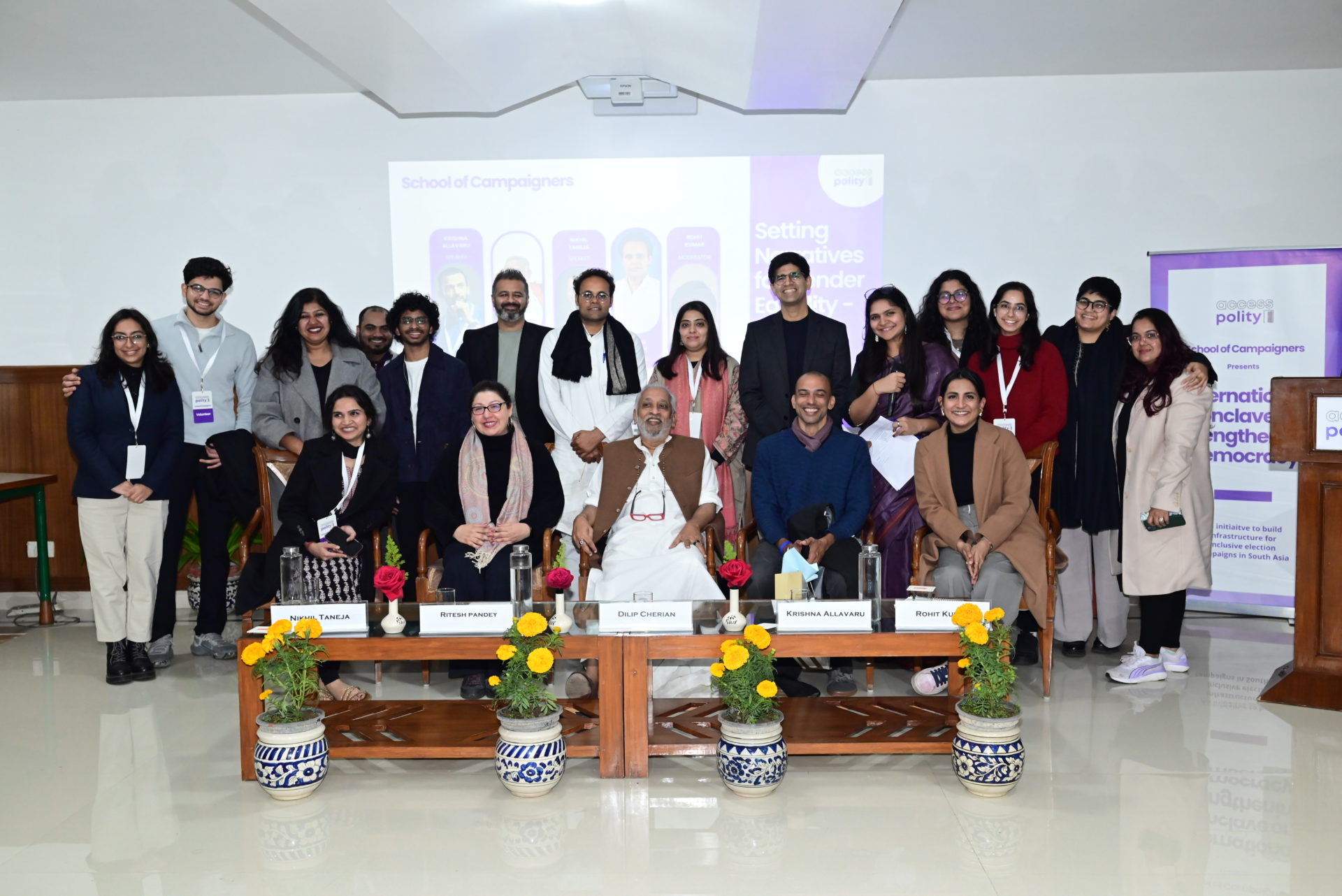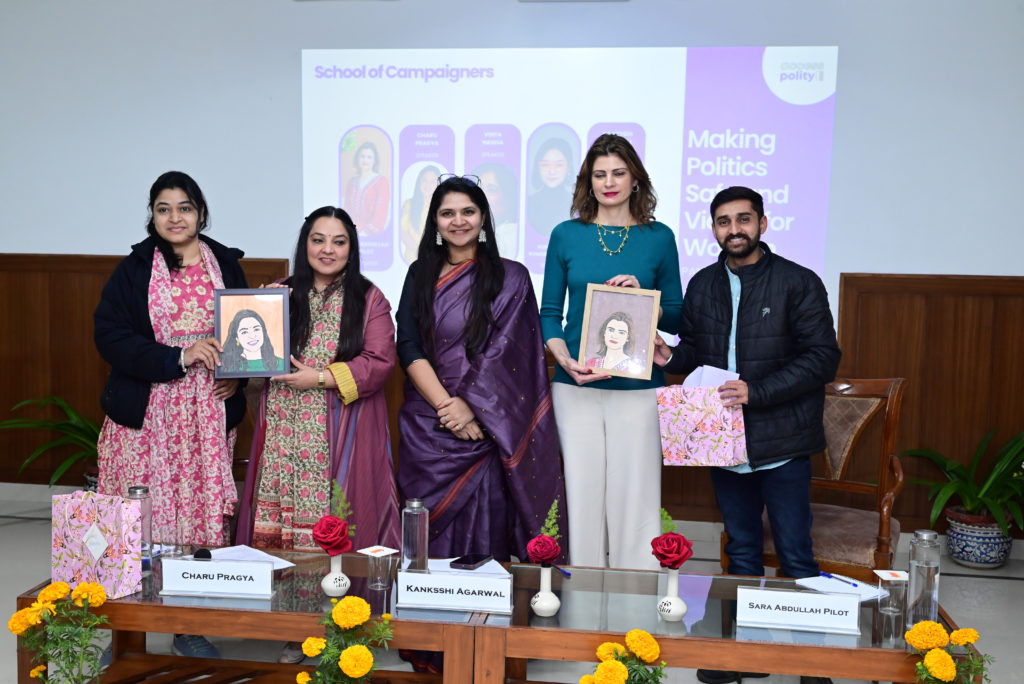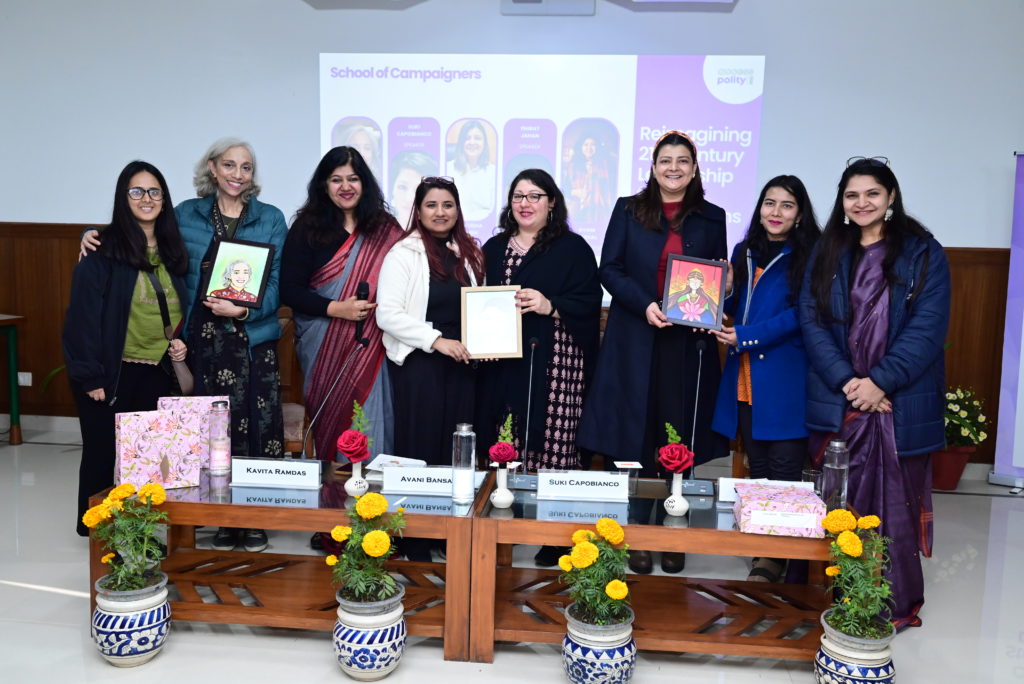By Vaanya Kalra
An international conference around gender justice was held on January 10, 2025 under ‘School of Campaigners’ program by Access Polity. The one day conference saw three panel discussions, with a range of expert speakers, focused on gender equality, political leadership, and the role of men as allies in creating inclusive environments. The conference took place at the TERI Retreat Centre, Gurugram, from 11 AM to 6 PM, and featured esteemed leaders, policymakers, and changemakers dedicated to reimagining 21st-century leadership through a gender lens.
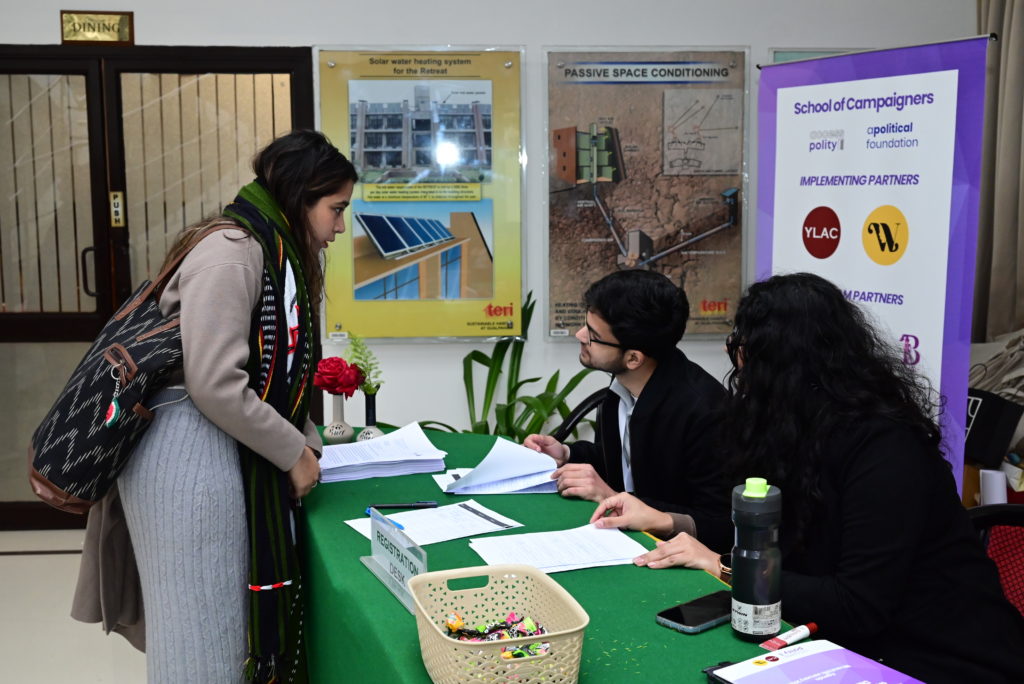
By way of a quick background, ‘Access Polity’s initiative ‘School of Campaigners’ is an initiative to build infrastructure for inclusive election campaigns in South Asia. Towards this purpose, ‘School of Campaigners’ was launched in 2024, where 20 political consultants– 18 from India and 2 from Philippines were selected and trained over six weeks period in an online format on ‘Running Gender Inclusive Political Campaigns.’ The cohort met on 9th- 10th January, 2025 at TERI Gurgaon for a two day meet, discussing various themes on ‘emerging political ecosystem through gender lens’. The conference on the 10th Jan, 2025 was to extend the conversation on inclusivity and gender lens by inviting experts and people working in the field, alongside members from the public. The conference had three panels, with brilliant speakers from across the political spectrum to talk on ‘gender and politics’ and ‘strengthening democracy’. The conference on 10th January was attended by about 70 invited people from across political, policy and gender ecosystem.
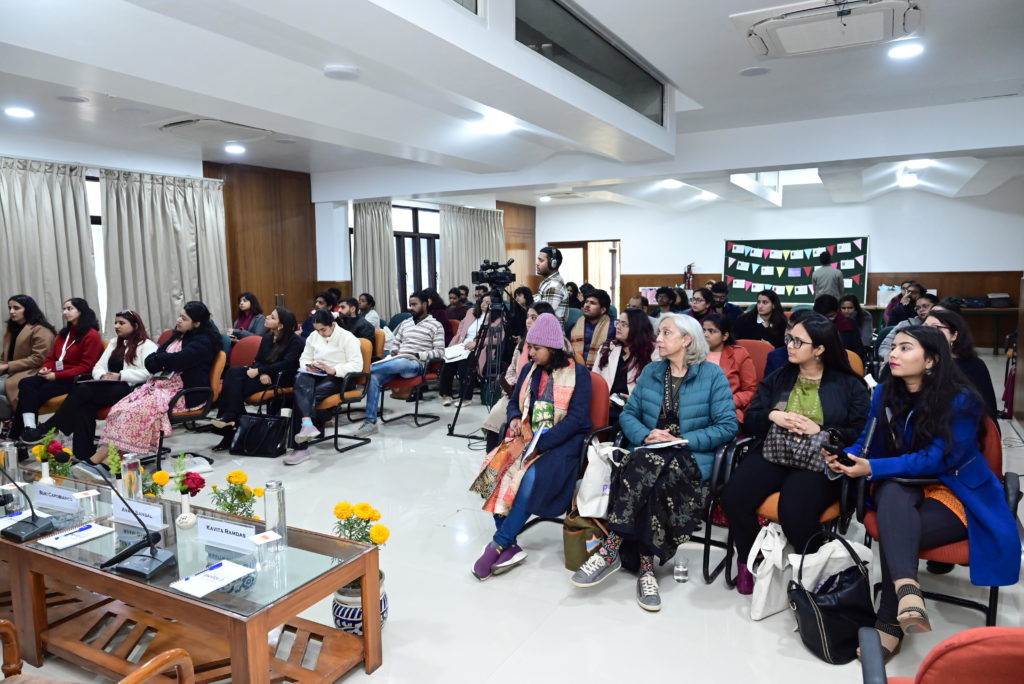
Panel Highlights:
- Panel 1 (12:00PM): Reimagining 21st Century Leadership from a Gender Lens
Featured:
- Kavita Nandini Ramdas, Intersectional Feminist & Public Intellectual
- Suki Capobianco, Chief Strategy Officer, Apolitical Foundation
- Vasudha Singh, Founder & CEO of VoteBridge
- Avani Bansal, Advocate, Supreme Court of India
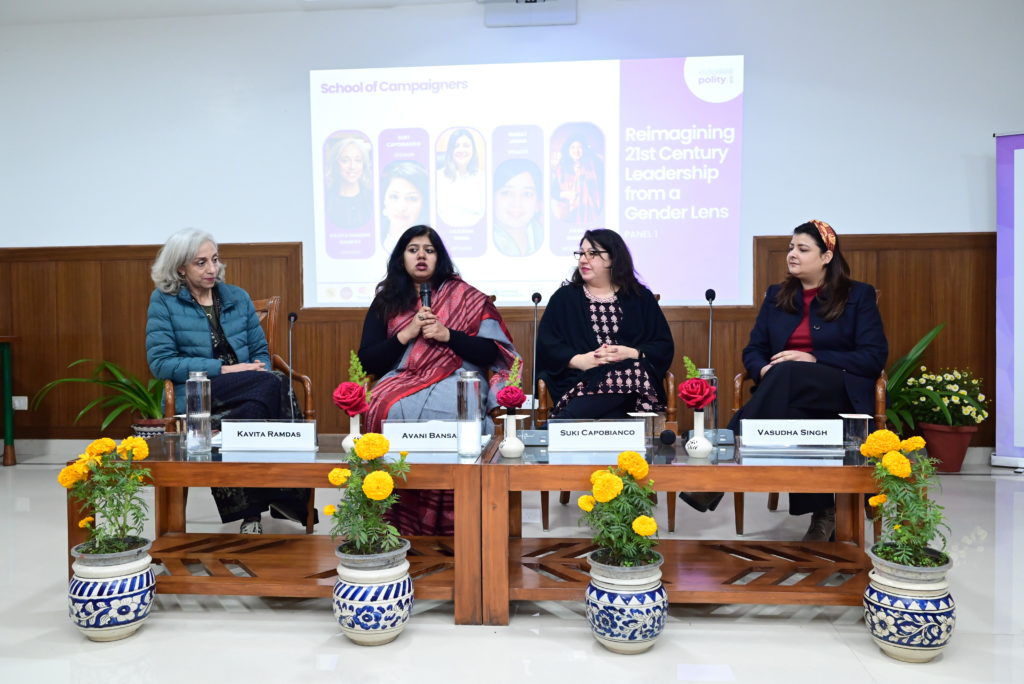
Insights: The panel delved deeply into the structural barriers that hinder women’s leadership and the necessity of redefining leadership paradigms to include intersectional perspectives. Kavita Nandini Ramdas emphasized the importance of grassroots movements in empowering marginalized voices and the critical role of policy in fostering equitable leadership opportunities. Suki Capobianco shed light on global best practices for inclusive leadership, particularly the value of gender-balanced teams in decision-making processes. Avani Bansal underscored the need for legal reforms to eliminate biases and create pathways for women in political and professional spaces.
They critiqued traditional patriarchal norms that perpetuate binary thinking, advocating for dismantling these frameworks to foster inclusivity. Furthermore, they highlighted the need for policies to support mentorship and sponsorship for women and gender minorities, recognizing that leadership must transcend hierarchical and binary constraints. The feminist lens they adopted envisioned a world where leadership is equitable, collaborative, and truly inclusive of all genders.
- Panel 2 (2:30PM): Making Politics Safe and Liable for Women
Featured:
- Sara Abdullah Pilot, Founder, Centre for Equity & Inclusion (CEQUIN)
- Charu Pragya, Spokesperson, BJP
- Kanksshi Agarwal, Founder, Access Polity & School of Campaigners
Insights: The Panel started off with an extremely strong question, “How will we look forward, if we are constantly watching our back?” The panel addressed the need for systemic reforms to create safer and more viable political spaces for women. Discussions revolved around the implementation of POSH (Prevention of Sexual Harassment) guidelines in political spheres and the urgent need to eliminate systemic barriers hindering women’s participation. Sara Abdullah Pilot emphasized the importance of cultural shifts alongside institutional measures to ensure equitable representation. Charu Pragya advocated for redefining feminism within the Indian sociopolitical framework, focusing on collaboration rather than confrontation. Kanksshi Agarwal discussed the importance of inclusive leadership training and mentorship programs to empower women entering politics.
The speakers also highlighted the importance of transparency in political systems to build trust and encourage women to actively engage in public leadership roles. They called for election processes that are inclusive, safe, and accessible, coupled with gender-neutral approaches to political campaigning.
- Panel 3 (4:30PM): Setting Narratives for Gender Equality – Men as Allies
Featured:
- Dilip Cherian, Founder, Perfect Relations
- Krishna Allavuru, National Inchange , Indian Youth Congress
- Nikhil Taneja, Co-Founder, Yuvaa
- Rohit Kumar, Co-Founder, Young Leaders for Active Citizenship
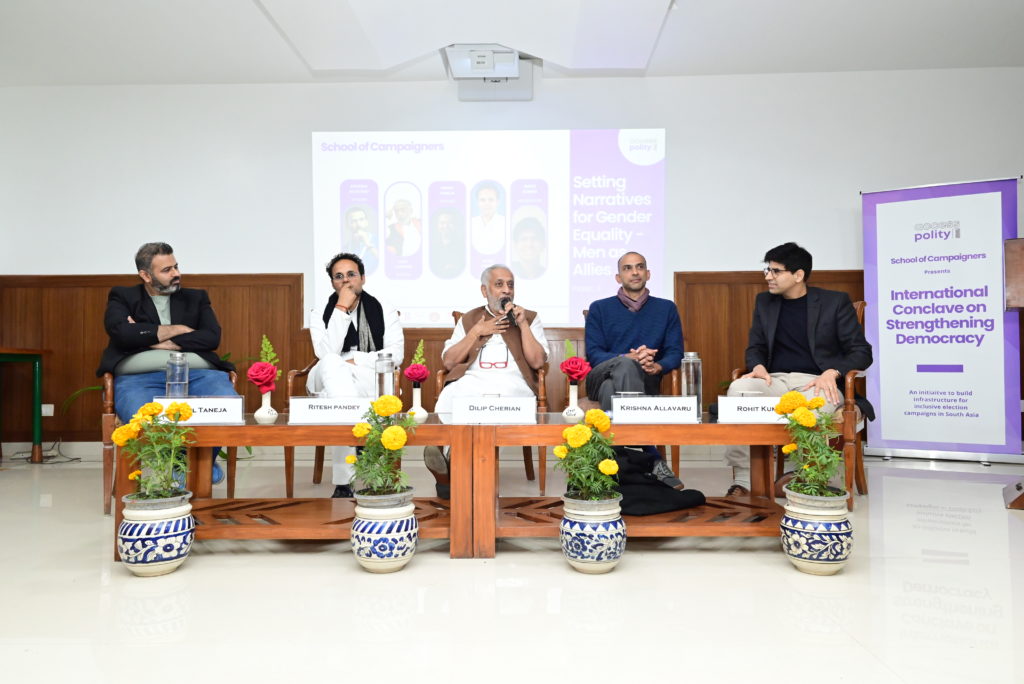
Insights: The panel explored the deep-seated structural challenges that continue to limit women’s leadership opportunities and the urgent need to reshape leadership frameworks to include diverse, intersectional perspectives. Nikhil Taneja emphasized the importance of redefining masculinity, urging men to acknowledge their own vulnerability and challenge the emotional constraints that patriarchy imposes on them. Krishna Allavaru focused on the gap between talk and action in the political arena, critiquing the lack of genuine commitment to gender equality in politics. Representation, he argued, is not enough if women are not truly integrated into decision-making processes.
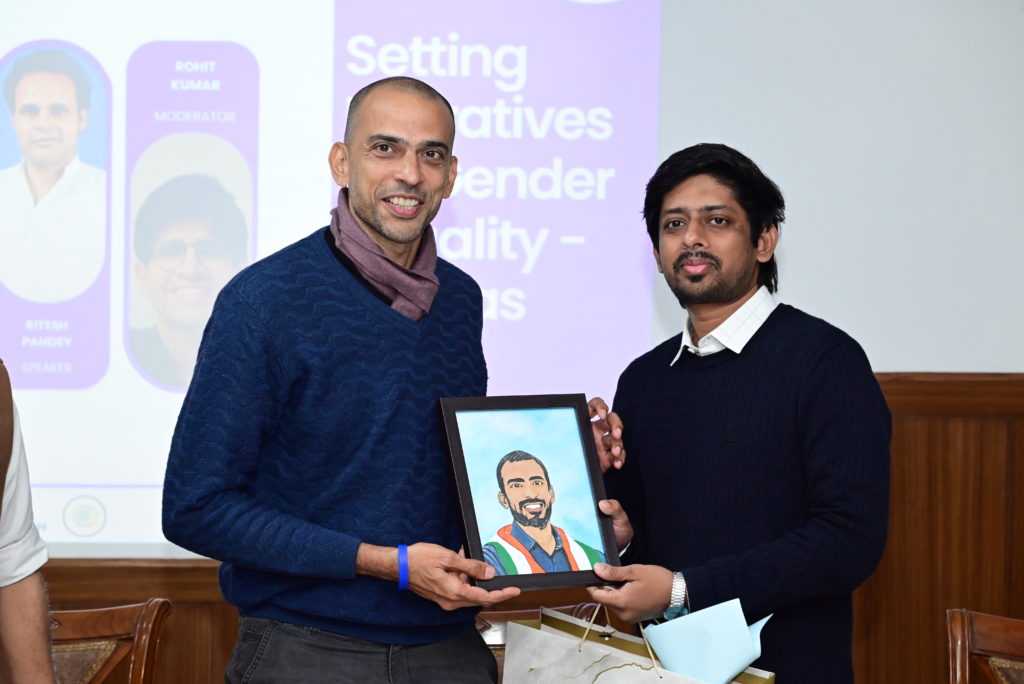
Ritesh Pandey shed light on the paradox of reservations in politics, where women are often used as symbolic figures, while male family members control the political agenda behind closed doors. Dilip Cherian discussed the critical role of allies in amplifying women’s voices.
The panelists advocated for a feminist, intersectional lens that envisions leadership as collaborative, inclusive, and free from the constraints of patriarchal and binary thinking. They emphasized that leadership should be redefined to create equitable spaces where all genders can thrive.
Advocacy Work
As part of ‘Making Politics Safe and Viable For Women’, Kanksshi Agarwal, founder of ‘Access Polity’ sent a Representation to ‘Election Commission of India’ (ECI) with inputs by Adv. Avani Bansal as a lawyer, on 30th December, 2024, making an intervention and seeking implementation of POSH (Prevention of Sexual Harassment At Workplace) on Political Parties in India. The representation to the ECI highlights the fact that according to a report published by UN Women and Centre for Social Research on Violence against Women in Politics in South Asian countries, 90% of women refrain from active involvement in politics on account of fear and violence. The representation emphasises that the issue of women’s safety has not become mainstream in India, and requests the ECI to illuminate their position as regards the implementation of POSH in political parties in India.
As a part of the School of Campaigners- Asia, Access Polity also collaborated with Angat Bayi, a Filipino organization based in Manila, to invite campaigners to participate in this program. The program witnessed expert insights from Filipino participants who have worked in national campaigns.
Key Partners
School of Campaigners’ two day event on 9th and 10th of January, 2025, along with the training of cohort of political consultants for designing gender inclusive campaigns was done in collaboration with YLAC (Young Leaders for Active Citizenship) and The Womb.
Several other organisations also came together as knowledge partners for this program – Chaaipani, India Action Project, One Future Collective, Angat Bai, Jarvis, The Daily Eye, Tattle, Sapiens Research. Kala Gahan was the gifting partner.
The International Conclave on Strengthening Democracy in India exemplified a milestone in advancing inclusive political dialogue and action. By bringing together influential voices from across the globe, the event succeeded in addressing the urgent need for gender equity and reimagined leadership paradigms. It also fostered a commitment to creating safer, more accessible political spaces for marginalized communities. The robust discussions, innovative solutions, and collaborative initiatives launched at the conclave mark a promising step forward in strengthening democracy in India. This conversation added much value to the ongoing concerns around developing policies and laws from a critical gender lens.
Note : Vaanya was a rapporteur for the conference and is a passionate young person who actively works in the area of human rights, social change and international relations.


